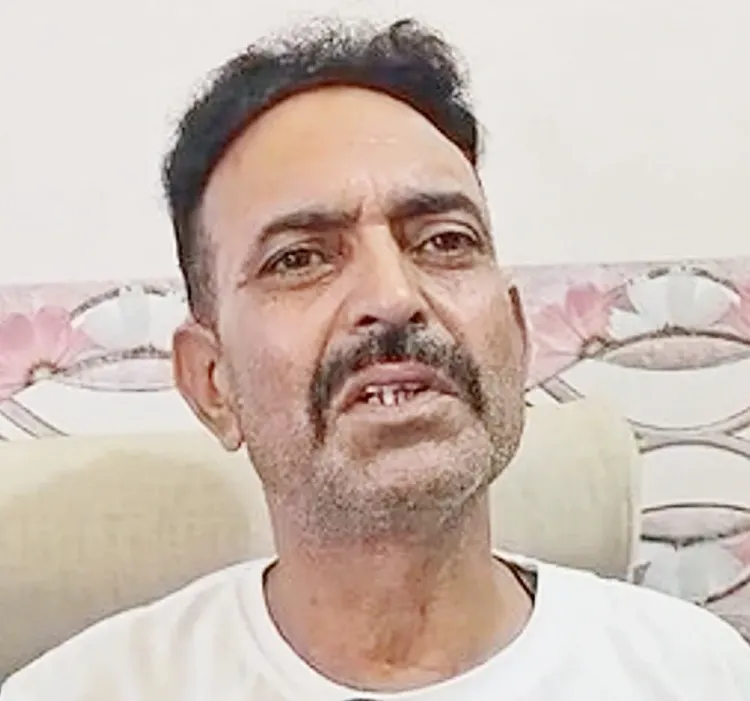How Did Kargil Hero Nawab Wasim Survive 7 Bullets and Inspire Future Football Stars?

Synopsis
Key Takeaways
- Nawab Wasim's bravery during the Kargil War serves as an inspiration for future generations.
- He survived seven bullet wounds, showcasing incredible resilience.
- After retiring from the army, he now coaches local youth in football.
- His efforts aim to combat issues like drug abuse among children.
- Sports can foster important values such as discipline and patriotism.
Ramnagar, July 26 (NationPress) Each year, on July 26, India commemorates Kargil Vijay Diwas, paying tribute to the courage and sacrifices of soldiers who defended against enemy forces during the 1999 Kargil conflict. One of the most inspiring narratives is that of Subedar Major Nawab Wasim ur Rehman, a war hero from Ramnagar, Uttarakhand, who, despite being hit by seven bullets, continued to fight for 20 minutes.
During the Kargil war, Indian soldiers from various regions were deployed to the perilous, snow-laden battlegrounds, with approximately 75 brave soldiers from Uttarakhand making the ultimate sacrifice and many others sustaining grave injuries. Nawab Wasim from Nainital district was one such soldier, struck by seven AK-47 bullets—six in his right leg and one in his left—yet he kept fighting alongside his unit.
“That morning was extraordinary,” Nawab Wasim recalls.
“We were advancing near Tiger Hill when enemy gunfire unleashed upon us. My comrade, Captain Sumit Rai, was martyred in the initial onslaught. Retreat was not an option; we had to uphold the nation’s honour.”
Originally from Lansdowne in Pauri Garhwal, Nawab Wasim enlisted in the Garhwal Rifles in 1990. After a two-year stint in Kupwara (Jammu & Kashmir), he was to move to Joshimath, but the onset of the Kargil War redirected him straight to the frontline, positioned at an astounding altitude of 4,700 meters.
“The enemy was positioned at a higher elevation, with bullets and mortars raining down. We climbed through the night. Amidst the chaos, six bullets struck my right leg and one my left. Yet, I felt no pain, only the burning desire to overcome the enemy. I kept firing, oblivious to my injuries. It was only when I attempted to stand and couldn’t that I realized I had been hit,” he shared with IANS.
Eventually, Wasim was airlifted and treated by Major General Chopra, who performed the surgery that saved his legs. After an arduous recovery, Nawab Wasim stood tall once more, embodying courage and resilience.
After nearly two decades of service, Nawab Wasim retired from the Indian Army in 2019 with the rank of Subedar Major. However, his mission did not conclude there. Today, he continues to serve the community, but this time on the football field.
Now residing in Ramnagar, Wasim has committed himself to empowering local youth. Disturbed by the rising issue of drug abuse and aimless adolescence, he chose to invest his energy into coaching. He currently trains over 150 children from Ramnagar and nearby areas—at no cost—in football. His passion and discipline have transformed his coaching ground into a space beyond mere sport; it has evolved into a school of values.
“Witnessing children succumb to drugs is heart-wrenching,” he expressed.
“We fought for this nation, endured bullets for it. Now, I combat to safeguard its future. Sports can cultivate discipline, self-confidence, and patriotism. That’s my new mission.”
Thanks to his dedication, several of his students have progressed to play at the national level, a true testament to his mentorship and the spirit of perseverance.
His football field in Ramnagar has become a symbol of hope, a place where young minds are nurtured, and hearts are inspired to love and serve the nation.
“All we seek is for the country to remember us. Let future generations acknowledge the sacrifices made for the freedom they enjoy today,” he added.
Kargil Vijay Diwas is observed annually on July 26, honoring India’s hard-won victory in the Kargil War of 1999. The conflict ignited in May 1999 when Pakistani troops, disguised as militants, covertly took control of key high-altitude positions in the Kargil region of India. To regain these perilous mountain heights, the Indian Army launched “Operation Vijay,” a formidable mission undertaken under severe weather conditions.










